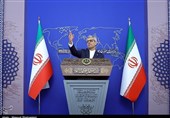Iranian President Raps IAEA’s Double Standards
TEHRAN (Tasnim) – President of Iran Masoud Pezeshkian called on the UN nuclear agency to avoid double standards and uphold the rights of all members without discrimination.
Pezeshkian and his French counterpart Emmanuel Macron held a telephone conversation on Sunday night.
Reacting to the concern expressed by the French president about the suspension of Iran’s cooperation with the International Atomic Energy Agency, Pezeshkian criticized the UN nuclear chief for making incorrect reports about Iran’s nuclear activities and refusing to condemn the American and Israeli military strikes on Iran’s nuclear facilities.
Despite Iran’s interaction with the IAEA, Grossi has not acted impartially, Pezeshkian said, describing Iran’s decision to suspend cooperation with the UN nuclear agency as a natural reaction to unjustifiable, unconstructive and destructive behaviors.
He also condemned the military aggression by the US and Israeli regime that resulted in the martyrdom of hundreds of Iranian people, including military commanders and nuclear scientists, saying the greater pity is that the self-proclaimed advocates of human rights and international law rushed to justify such inhumane and illegal attacks instead of deploring them.
Pezeshkian described Grossi’s conduct as a source of concern and formation of serious challenges eroding the Iranian nation’s trust.
The first step in rebuilding trust is the IAEA’s full commitment to the observance of its own rules and regulations, the president added.
The question is why the criminal Zionist regime, which is not a member of the NPT and has violated all international rules in the past years, should become a basis and reference for the IAEA’s reports, Pezeshkian told Macron.
“Such double standards have created numerous problems for the regional and world security. The IAEA is expected to uphold the rights of countries, avoid double standards, and defend the rights of all member states,” the Iranian president added.
Even if Iran resumes cooperation with the IAEA, there will be no guarantee that the country’s nuclear facilities won’t be struck again, he added.
Reiterating Iran’s policy of settlement of disputes through diplomacy and dialogue and avoidance of wars and insecurity, Pezeshkian expressed hope that the international organizations, including the IAEA, would honor their commitments and steer the world into the course of peace and security, not wars and conflicts.
While the Zionist regime waged a war of aggression against Iran on June 13 and struck Iran’s military, nuclear and residential areas for 12 days, the US stepped in and conducted military attacks on three nuclear sites in Iran’s Natanz, Fordow and Isfahan on June 22.
The Iranian military forces conducted powerful counterattacks immediately after the aggression. The Islamic Revolution Guards Corps Aerospace Force carried out 22 waves of retaliatory missile strikes against the Zionist regime as part of Operation True Promise III that inflicted heavy losses on cities across the occupied territories.
Also, in response to the US attacks, Iranian armed forces launched a wave of missiles at al-Udeid air base in Qatar, the largest American military base in West Asia.
A ceasefire that came into force on June 24 brought the fighting to a halt.






